
JIS screws are invariably ruined by people who don’t know they exist.
Despite 15 years in solar, my experience as an apprentice isn’t as distant as you might think.
My journey has included two full electrical apprenticeships and a brief detour for electrical engineering. The first private training organisation I attended, however, left much to be desired with its substandard course material. It was an eye-opener to realise that this “institution” was, in fact, a religious organisation with a training front. This revelation wasn’t explicit until you saw the company home screen where the instructor logged on each morning. His employer was asking him to donate 10% of his wage back to them, they call it tithing.
They Were Simply Getting Things Wrong
As an example, they had a New Zealander mispronouncing “spline” as “spleen” drive, misdescribing what was actually an obsolete XZN screwdriver. They laughably failed to even mention nor differentiate between Phillips, Pozidrive, and JIS screwdrivers. After pointing this out and sending the instructor a Wikipedia link. I got a chirpy response.
“Oh, we’ve been teaching this for a couple of years now, good pickup!” said the instructor.
It was painful knowing that fact. The only saving grace was the organisation’s agility in editing their course material immediately. What truly distressed me, however, were the course books written by non-electricians. They attempted to describe fundamental electrical concepts, and without the accompanying diagrams, even I would have been completely lost. For instance, they asked:
“What is the current voltage with the switch closed?”
I have simplified the wording in the article, but this is an actual example.
The Wucking Fot?
There’s no such thing as a “current voltage” like there are “current affairs” shows on TV. Words like ‘current’ and ‘voltage’ have specific, distinct meanings. They’re part of the technical language electricians use to communicate complex ideas. The question should have been phrased as:
“What is the voltage across these points when the circuit is closed”
Or maybe use a different word :
“When the switch is closed, what voltage will be present?”
I was relieved when the training company, daunted by the potential of failing RTO auditing, ceased offering electrical training after my first year. My subsequent experience at TAFE made me realise it was sadly a shadow of what it had been 25 years earlier.
Imagine sitting your year 12 exams and being given a broken calculator. Thanks, TAFE
What’s It Got To Do With Anything Currently?
This experience sticks with me, especially as a native English speaker and self-proclaimed grammar nazi. It resonated because of the classmates at the back of the room who spoke English as a second language. Miscommunications like this could completely throw them off, and I often clarified points with the tutor to ensure everyone understood the concepts that the textbook failed to explain adequately.
Now, as I ponder those classmates possibly working in solar energy, I wonder how they navigate the often inadequate current specification of inverters. This topic alone warrants a whole separate article.
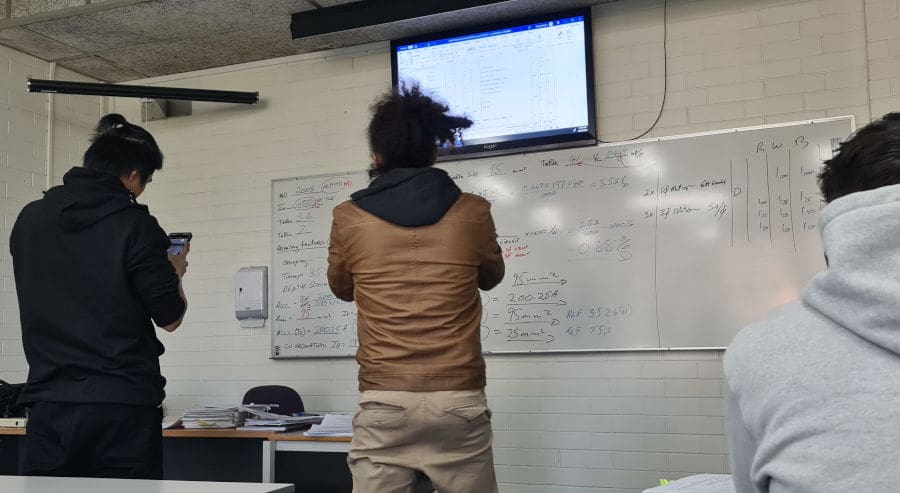
TAFE “big screen” that isn’t, and glare from all the lights means you’re forced to get up and photograph the whiteboard with your phone.
Being A Pedant Pays Off
When I pursued additional courses to add solar to my qualifications, I couldn’t resist marking the assessment books with a red pen, highlighting the errors in the questions. As the son of two teachers, this was almost second nature, albeit a surefire way to irk the trainers. To my surprise, they welcomed the feedback and even offered me a part-time job. Full credit to the better kind of private training organisation.
The CEC Is Our Nemesis
I encountered further challenges with solar accreditations. As an auto electrician, I’m well-versed in DC systems and complex circuits. 12-15 years ago, I was on the roof installing panels while also teaching and reassuring the solar-qualified sparky that what he was wiring up was correct. He hadn’t exercised that part of his brain since leaving trade school because most domestic electrical revolves around one number, 230Vac, then picking the right breaker for the cable.
However, when I applied to the CEC, I faced a setback. They initially denied my application because, according to them, a licence in training wasn’t a real licence. The government would beg to differ, the card I carried said “any electrical work” After a few emails they clarified that they’d made the rule up and they should probably edit their own website to make that clear. No Apprentices
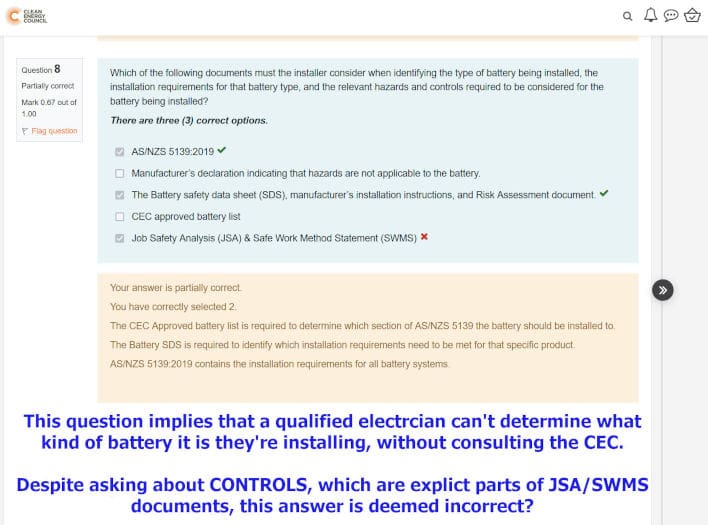
After spending $2500 plus a week off work doing battery training, the CEC still want to quiz you just because they can.
So what about doing the solar training as an elective at the end of the apprenticeship, as an alternative to communications cabling? That was a commonly available option, but despite doing the academic work while holding a license in training, the CEC couldn’t bring themselves to offer the qualification. They weren’t about to answer any embarrassing questions about it either.
So, for me, a 4-year apprenticeship was made into six years by Covid, the CEC and TAFE incompetence.
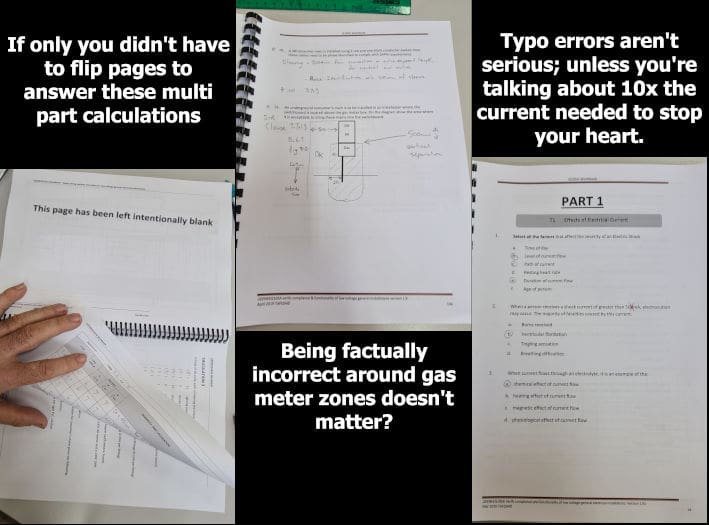
TAFE have students studying graphic design and pre-press layouts, yet they can’t even get a work book straight.
I Could Rant For Days
The standards of education I’ve seen first-hand at TAFE are a bit dismal. Here we are a first world, expensive labour country, head long into the information age. Despite the incredible legacy of public education and public utilities our training seems to vary between ordinary and just rubbish.
The only stand up barney I have ever had with a teacher was over assessment in a lighting subject that was barely 18 hours. The sparse 28 page work book had one solitary mention of LEDs (which have now replaced everything in lighting) TAFE later admitted they needed to update it a bit. I’ll argue that if it was written in 2013(?) it was already horribly out of date.
My boss at the time put it succinctly by saying;
“Oh good, they’re teaching you about steam engines in the digital age”
They didn’t even cover colour temperature properly, I literally learnt more about that from my dentist, because the ADA mandates he has to replace fluorescent tubes every eight months. If he doesn’t get the colour temperature right, your white teeth won’t be colour-matched to your fillings.
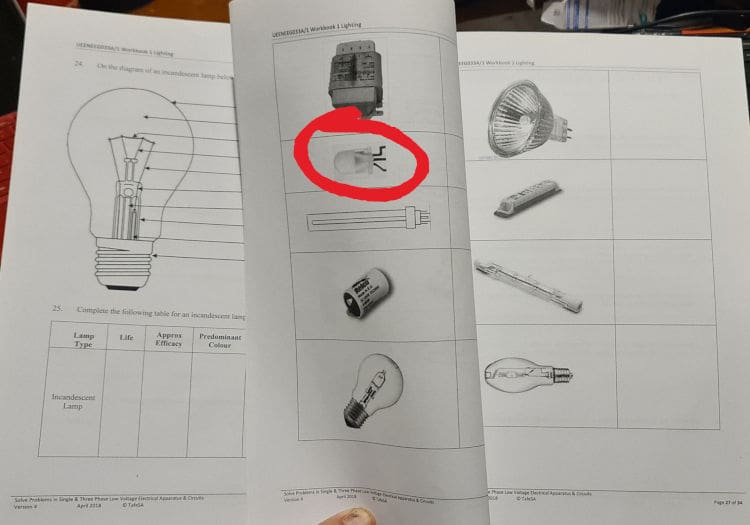
Circled in red is the only mention of LEDs. In fact you can see the whole book is weighty enough I think my 6 year old could pass the subject.
We Need To Spend More On Decent Education
That means better TAFE courses and teachers and better standards for private providers.
Public authorities like the Electricity Trust of South Australia & Telecom used to have an intake. They would suck up 400 apprentices each, every year taking on a heap of school leavers on general principle. On paper, it made these utilities “inefficient”, and much was made of that when politicians sold us the lies of privatisation.
ETSA was a fully vertically integrated generator, transmission operator, distributor and retailer. Not only did they run the technical regulator (to police licenced electricians), but they also had ETSA works depots co-located with TAFE.
Every apprentice, public or private, got training from the people running the entire electricity system.
While there is a place for private training, what I experienced first-hand isn’t sustainable. The head of a TAFE campus was trying to run the school, and teach classes and mark assessments as well. He needed a personal assistant and another teacher (not a secretary in a regional town 300km away). Instead, the wheels just fell off all the time.
The delay to my qualification cost a great deal in terms of pay and personal wellbeing, but it costs us all when people can’t get good training in a timely fashion.

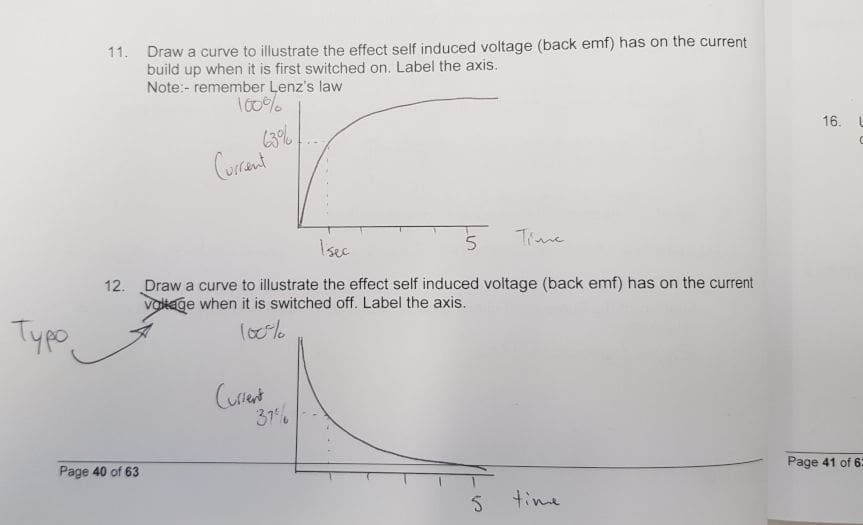
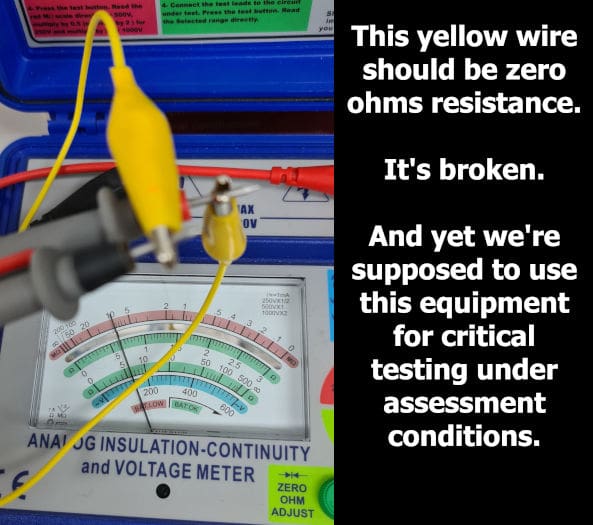
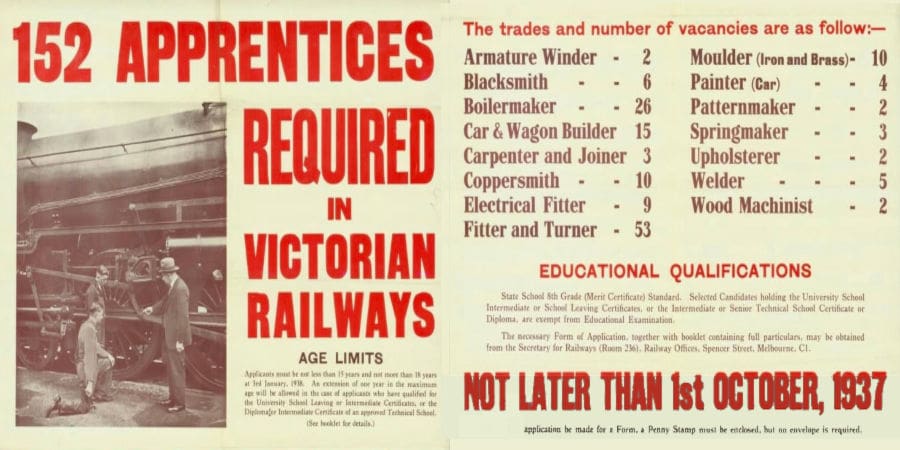
 RSS - Posts
RSS - Posts



Fully lines up with my experience with TAFE before it was passed to CQU’s control.
Most IT materials were third party sites with a number of broken links that are part of the expected exercises. A majority of them a significantly aged as well.
Post CQU having control its just too expensive to even look at anymore.
Though i doubt its improved material wise.
The teachers were great but completely over worked and without adequate resources.
Half the time the IT teacher was in another town because he ran the IT courses for both campus’s.
Great article Anthony. I remember back in 2010 chatting with a Melbourne University professor of electrical engineering who explained that Australia was poised to hit a skills brick wall in its efforts to decarbonise the electricity system. Melbourne Uni, the highest internationally rated university in the country, had stopped training electrical power system engineers several years back (the electrical engineering department instead focussed on computing, communications and microelectronics). The professor explained that the Uni didn’t have much choice because when the power networks were privatised they stopped hiring new graduates and sacked a bunch of their existing engineers because the management thought we had an overcapacity of power generation (which was true) and there wasn’t the need to do much engineering analysis about the design of the network. Sure enough around seven years later we began to encounter problems with connecting all these new wind and solar generators, not to mention dealing with a bunch of bunkum about whether we could integrate large amounts of distributed solar PV. Electrical network engineers are now worth their weight in gold and Melbourne Uni had to hire in a group of people from overseas to restart its electrical system engineering capability.
An encouraging expose on the terrible state of TAFE training. No doubt if they raise the standard to what it should be they’ll be demanding degree status for those that pass.
Always good practice to define any acronyms by writing them out in full at first use.
Private for-profit RTO’s do vary widely with the quality of their training packages, but, in the end, it really is down to the quality of the trainer. My field was HV, and in the public courses I could have a mix of housebashers taking the next step, electrical engineers, and power station operators. Quite the challenge to keep it real for all of them, you introduce your own real-world experiences, ask them of theirs. I introduced substantial amounts of my own material, used external websites–the Renew Economy access to the live NEM data was brilliant–and kept hammering the company on errors, both factual and grammatical in the content. I obviously always had good feedback, as I consistently had repeat deliveries for on-site training.
So, good course content is a must, and not always a given, but it is ultimately down to the trainer delivering. And here we have the problem. It is just not a popular career choice–people sit through inductions, watch the trainer delivering, and think about how boring it must be. And delivering inductions is, I really tried to avoid it wherever possible. Some old trainers get really sour, some don’t, and it is an ageing workforce, at least here in the west. My company bent over backwards to keep me on last year when I said I had had enough at 70 y.o., but I just couldn’t stay motivated any longer, and would be doing both myself and my candidates a mis-service to continue. To sum up, for the tl,dr
1) Apprentice outcomes are too reliant on placement , both for the people who they are working with, and what they have to actually do.
2) Privatisation of the training network has given us a minefield to negotiate
3) Hard to get good, motivated trainers who enjoy seeing the ” lightbulb moment” when someone has actually grasped a concept which has previously eluded them.
All of you have raised some very valid points abou RTOs and the state of TAFE training, I too have undertaken further training and have noticed the decline. I had to read the ‘current voltage’ part twice – ohms law anyone? I’m glad they didn’t mention Coulomb’s, they probably thought that had something to do with residential air conditioning …
Good on you for being candid.
Cheers Dave,
(All the comments are moderated just so you know)
I can fully understand your situation and frustration with documents and grammar. I am working in IT and reading frequently what I would call non-understandable rubbish. I wonder where this leads to. It is no wonder we have all these successful hacking events into corporate systems, as simply they cannot communicate internally in an unambiguous way. Not really your topic, but I wanted to share that this problem is cross-industry.
I own childcare centres and set up my own RTO due to the substandard teaching my employees were getting at TAFE. I could write an essay about the problems with trainee and apprenticeship training in the childcare industry, but I can relate to most of the issues raised above.
I think the main problem is that the process is controlled by a bureaucracy, and a bureaucracy can only function by rules. But how do you create a rule about someone being an interesting and engaging teacher with a passion for the subject. So the bureaucracy rules via petty things that have nothing to do with the quality of the education. However you get rid of the rules, and then the auditors can find a reason to fail anyone that don’t like.
I was employed by Pye in 1967 on a traineeship. The course was the Electrinics & Communications Certificate. In those days they even taught Electron theory of transistors! One of my lecturers was an ex-IC designer from England. The Workshop skills taught I am still using: lathe skills, metal technology, & the best was to solder a 50mm cube from 2mm solid copper wire. That is hard! Too much heat & you get a cold adjacent joint. (Of course we cheated & made a jig to cool the wires!) The cube is twisted & if a joint lets go = fail.
After, I moved to Standard Telephones in Alexandria (working on Instrument calibration).STC had their own apprentice school with a full time teacher. All trainees & apprentices went through a basic skills training course at this school. Even Mike Quigley (ex NBN Ceo?), an Engineering Cadet I think went to this school
I totally agree with previous comments on the lack of Training undertaken by Government or larger Private institutions. OTC used to train their technical staff, but that has been dropped by Telstra. Even in Public Health, I tried to employ an Aboriginal trainee (in Biomedical Engineering) that would have been largely externally funded & could not get it across the line.
My feeling with the current Competency based training is there should be core skills nationally established so at least the core is well covered. These core skills would be different for different industries, but at least there would be a national consistency. I feel the core skills could be managed in a similar way that Standards are managed.
I feel Australia cannot take skilled persons from other countries leaving a skills gap there unless we are training sufficient people to cover the overall shortage. Proper Government skills management would ensure that there was funding & personnel to ensure on-going training. Also, TAFE needs proper funding so country colleges can skill country young adults.
thanks Anthony, i really appreciate the thoughts, generally agreed and the standard of ‘electricians’ reflects this situation – te question is what are we going to do about it?
In my experience the best approach is to have a management restructure, change the name of the campus and replace all the stationary… at least that’s what TAFE has been doing for the last 25 years and look where it’s got us.
Hi Anthony: I hear you brother! I am 72 (10 years retired). Over 45 years ago I completed the E & C certificate at TAFE. The North Sydney TAFE offered 20 optional subjects for the 4th part time year of that course. Their labs were magnificently equipped (due to industry links).
The last 25 years of my career were at a Biomedical Workshop in a teaching hospital, and I saw the saddening decline in the technicians who joined us. They desperately wanted to be problem solvers, but they did not know what they did not know.
With reference to your CV: Margherita replied to my recent E Mail, but I think she does not understand my point.
My panels were installed in 2017 and my Tesla PW2 was installed in 2020, but there are problems with the accuracy of the Tesla App measurements.
My total expenditures are past $40,000 since 2017 and I am desperately anxious to nail the Tesla App inaccuracies.
The local people I have discussed my situation with seem unable to focus on my story. I do not have much confidence in their abilities.
I am willing to pay even more money to you to decode complex technical difficulties.
If you are ever travelling North of Newcastle NSW, you might be able to call in here (Medowie), analyse the wiring, and correct the other peoples mistakes.
Patrick
This is true of pretty much everything TAFE. My father, a plumber, recently did his disconnect / reconnect course and was appalled at the fact they were given the answers to the assessments by the instructor.
Even then people still got the answer wrong and were given opportunities to correct their response.
No wonder the quality of worth is so shoddy, especially in the construction industry with defect after defect.
From my own perspective, i recently bought a 2 year old house, new build. After having a faulty breaker replaced. I was advised that my while panel and sub are non compliant, using recalled breakers and there is actually no easy to isolate the sub board itself. Whoever completed this and signed off on this work is a criminal.
I did a PRE-APPRENTICESHIP Course in 1960 and completed my Trades course in december 1963. So this exposure of later TAFE Abyssmal Teachings is making me laugh. One of my collegues went on to become a TAFE Teacher but quit in the 1980s when TAFE Started to be more interested in Income than learning and cut many essential subjects and matter from their courses.
Once upon a time the industry trained it’s own. Take aircraft engineers/mechanics for example. With a new type of aircraft the manufacturer provided the training, and the operators instructors were trained too. They then brought that training back home and taught the course. After a few years some of them got upset, left the company and setup their own training organisation, all approved by the authorities and supported by the operator of the aircraft.
Students were then encouraged to take leave and do the course on their own time, effectively paying for their own training, and jumping the queue of who was to be trained next.
This saved the company from having to pay these students their shift pay, and employing others on overtime to replace them while they were at school. It also used up the workers recreational leave. BIG benefits to the employer.
Generally the course used to be a little longer than a year’s leave, so it was ‘massaged’ a little to cut a few days off.
Are we better off now? I don’t think so!
Thanks Anthony- it is indeed a sad state of affairs.
As an ex electrician (electrical fitter/mechanic) who trained with a major supply authority in the 1970s, and also then an ex-electrical engineer in my former life (subsequently moved on to a completely different career path), I am appalled at what I see FAR too often.
Even the house we bought in the late 90s had massive electrical problems and issues in many areas which took a lot of work to bring up to scratch. (Just two examples were multiple metal light fittings with no earth wire run, and no way of getting one to the fitting, meaning that I had to change them to completely different double insulated light fittings, and swapped or bridged neutrals meaning that when I fitted an ELCB/safety switch on the lights, it would trip every time a light was turned on. The only solution was to combine the lighting circuits to just one).
Back in the day we had real quality training both at work and at TAFE.
What I’ve seen in new and near new houses belonging to friends makes me wonder even more.
To think they once called us “the smart country”! I think the opposite is true.
Hi David,
I think Bob Hawke wanted us to become the clever country because being the lucky country wasn’t going to cut it anymore. Yet we no longer make cars here.
The thing is that people love the idea of “the lucky country” but they never examine the full quote from the bloke who coined the phase, Donald Horne. He didn’t mean it as laudatory.
“Australia is a lucky country run mainly by second rate people who share its luck. It lives on other people’s ideas, and, although its ordinary people are adaptable, most of its leaders (in all fields) so lack curiosity about the events that surround them that they are often taken by surprise”
https://theconversation.com/donald-hornes-lucky-country-and-the-decline-of-the-public-intellectual-80743
Maybe this training explains why the sparky on a house we are getting built has put two fan heaters, each with a rated load of 1590W, on the same 10A lighting circuit…
With regard to the mispronunciation of words, particularly from teachers where English was the second language, I had the misfortune of watching a bunch of videos from a CompSci course my son was doing (networking).
What I am about to describe is not an exaggeration of what I witnessed …
The lecturer had an amazing verbal “tic”, in the fashion of those people who are prone to say “um” a lot, this lecturer would say something similar to “itchy ka”.
So if he want to say “the answer is 1001”
He would say: “the itchy ka answer itchyka is 1 itchyka 0itchyka 0itchyka 1”
There were even times he’d do double itchykas.
It was unwatchable for a native English speaker, god only knows what the large cohort of foreign students made of it.
Not sure why this article popped up in my feed (I’m not a sparky), but I’m glad i clicked, fantastic read!
I’ve had a couple of apprentices attend the local Tafe equivalent, they come back with outdated and irrelevant “skills” to the point that even when qualified they have critical gaps in their knowledge.
The rot seems industry-wide (I’ve known qualified carpenters who don’t know how to hang doors which just hurts my head to think about) and nobody seems to give a stuff.
Your first training school (the religious one) wouldn’t happen to be exclusive?
I have just completed a cert IV in training assessing, and I can’t agree more. I am an experienced high school teacher, and the quality of training and assessment in the course is rubbish, and directly contradicts what they claim to be teaching. There is more focus on correctly filling out forms, submitting paperwork and ticking boxes than anything that may benefit students.
50% of what I was taught could and should be generated by chatGPT, with no detriment to the training experience of students.
I’m hoping, and expecting, a big big shakeup of the VETIS training sector in the next 5-10 years
Hi everyone. Where would you suggest my soon look to for an apprenticeship? Any help appreciated
When I went to a Technical School, where we learnt woodworking, sheetmetalworking, and machine shop, as well as the academic subjects, there was an engineering firm opposite, where they even made castings for agricultural machinery – all out in the regional Gippsland town of Sale. (It was so long ago that teachers were competent in spelling and grammar.)
That’s all gone now.
Studying electrical engineering at a tertiary college (they’re all unis now), was OK for power and even solid state physics, but digital electronics and computers had run away from them in the early 1970s. On graduating, I found that it was self-taught knowledge on those subjects which got me a job in telecommunications design. Retraining the analog engineers in industry was too slow, and uni lecturers were too. Avid curiosity and being an energetic autodidact is no great social asset, but it pays big career dividends – lifelong.
It must be a right royal pain when those who can’t keep up are rule makers and can stand in your way. At least the regulatory requirements in telecommunications were mostly practical and not obstructive.
In a 30 year career, I did notice that the good years were the pioneer years when management was grateful to have folk who understood the new tech, and so stayed out of the way. As the mystique faded, they increasingly wanted to pee in the beer, and fighting off useless interference became a necessary skill. I called it “upward management”, while never letting on that it was in play.
It’s not bad being retired, really. Plenty of projects, and they’re all mine – no managers, and minimal risk of solar over-regulation as I’m off-grid. Wouldn’t go back to the big smoke for quids.
Currently studying engineering in ECU perth and it is exactly the same as you describe
Vinny says,
As a TAFE teacher in electro technology for several years I have witnessed the decline in relevant technical material and teaching hours available to teaching staff. An example being the number of hours available for a three year electricians course was around 1100 hours face to face class time, that has been reduced over a period of time to ( depending on the campus) 750 – 800 hours face to face. Your comments are very much on track in outlining the decline in trade standards where I believe the reduced hours are a significant contributor. To add to the problem is the introduction of the “ pay as your learn” teacher TAE qualification is also a factor extensive industry time and experience is no longer taken into account. The result being sub standard apprentices leaving with sub standard qualifications.
There seems to be a general ignorance about the Posidriv screw heads here in this country. At least one used to be able to buy them in hardware stores, but for some mysterious reason they have all but disappeared from the shelves. They are the standard in Europe for a many good reasons. They are far superior to the outdated Phillips heads, which were apparently designed so the screwdriver would slip before you break the screw, which may have been fine in the days of manual screwdrivers. Posidriv heads are designed not to slip and can even be used with a Phillips screwdriver, although not recommended. (You cannot use a Posidriv screwdriver on a Philips screw). This makes Posidriv more versatile and far more suitable to use with a battery drill, yet where are they in Australia ? Should they not be the standard after more than half a century of competition against an inferior solution?
Oh, btw if anyone knows where to buy them here in Australia, please let me know.
I am a proud 1964 ETSA Electrical Fitter Apprentice. I left Torrens Island for Toronto in1972 and spent 50 years as an active (13 years at Ford Oakville plus service work) Electrician and Electronics instructor at Sheridan College before returning home to Adelaide.
Despite many similarities between Canada and Australia, the mention of the Robertson screw is sadly lacking, both above and at Bunnings. Robertson screws were invented by a Canadian, Henry Ford could not secure the rights, and stuck with the much inferior Phillips for the auto industry. Since the patent has expired, GM is now using Robertson. There is a complete book on Robertson and how the USA screwed (pun intended) Canada again (the Arrow). There are almost no Philips or similar screws available at Home Depot or Lowes or Home Harware in Canada – every screw sold, including Tapcon, is Robertson. What happened to screws in Australia? Phillips should have disappeared years ago, replaced by Canadian Robertson!
The meter measuring the yellow wire would only be broken if after you had calibrated the resistance with a know resistance first or at least used the zero adjustment with the test leads shorted out first then depending on the length, size and quality of the termination of the cable to the alligator clips you will then be measuring the yellow leads resistance.
Of cause if they didn’t teach you how to set up an analogue meter of this design then you can blame the teacher as the meter is functioning as designed and not faulty.
Cert 3 in electrotechnilogy is a joke.
-curriculum is antiquated
– assessments often don’t match the curriculum
-95% of the curriculum doesn’t help you with anything related to the job and the teachers even say “you will never use this, but we have to teach it”
– often questions are wrong and or poorly written in the assessment tasks.in addition , answers can Often be wrong, yet we get told by teachers to just circle the wrong answer any way
-dinosaur teachers that are just there for the pay check. Simply read slides and don’t answer any questions.
Such a waste of time going to Tafe when it doesn’t help you with what you are expected to do on a job site…
Yes, they should be teaching you more about LED lighting, but you have to have an understanding of the specifications and fault finding at least of all previous lighting types as not everything has been replaced with LED yet.
It’s now 40 years ago I went through a one year TAFE course pre-vocational Engineering and construction which was available after year 10. It was the best introduction to all trades, the course material was fine, the supporting subject for math and English were based on trade practical situations along with resume and interview skills. The physical education even involved fitness for work including checking for colour blindness test for trades like electrical, that was good to know.
1st semester you tried every trade, 2nd was construction or engineering trades more in depth, then 3rd at least 3 related trades, for me that was first year level for electrical, electronic and auto electrical.
This format was the best at introducing the option of a trade to high school age students if you felt an office job or academia wasn’t what you wanted this year long course gave you a great insight into trade work as a career and at the end you could still go back to high school or uni with at the very least an understanding of trades and some useful skills as well.
Maybe it happened because it was the Hawke-Keating Labor years and subsequent years of liberal governments had a penchant for defending tafe along with other government services, so the decline maybe more to do with funding and priorities depriving you of up to date information and equipment that tafe still hasn’t recovered from. So pointing out and helping to correct problems by making submissions for updates and upgrades might be a more useful use of your time rather than this article. What’s the saying a good tradesperson doesn’t blame their tools.
Not an electrician, but is the problem institutions, courses, something more complicated, or a mixture thereof?
A relative’s friend’s son for instance attended a private college so as to pass the units he needed for university. He was flabbergasted at how many government funded students (the vast majority?) simply never bothered to turn up for class. How many millions of taxpayer funds are wasted each year on this?
My own studies – both professional and paraprofessional\technical were quite different to your own or the son’s experience. The TAFE units were taught either by qualified and experienced TAFE staff, or a qualified practicing paraprofessional in the field. I still have a few of the coursebooks somewhere around though I’ve not looked at them in eons. Oh and the pass mark in at least in some subjects was 70% I believe not 50%!!!
Likewise my uni subjects were taught by former professionals who’d opted to go academic track instead – there were also some filler subjects with no connection to the field, but just ignore those.
Both professional and paraprofessional seemed to have packed classes – interest and engagement was high. Actual employment after graduation? Well that’s very unclear.
Perhaps it depends if the organisation providing the training or education cares more about their role or the money they receive, and whether those teaching it are there for the money\job security or providing up to date training.
A quick search suggests the only place in Australia now offering professional studies is Melbourne – though there are multiple online providers, and the local 2 year paraprofessional\TAFE qualification is now a 1 year course.
Maybe there’s a lot of dumbing down going on? Don’t bother hiring qualified staff so don’t bother training staff so …
Our family business began in 1895, as electrical engineers, and I am always speaking to my dad about different changes in the system etc.
I did a stint at TAFE, and came across a student who could not read, write properly or do basic maths………an electrical apprentice!……… and when i failed him n several modules which i believe needed to be 100%, he went to the union who jumped up and down and cried discrimination!
Anyway the director got another teacher to pass him.
We are there to teach and educate the things that can catch you put, and to do the trade. When a student has a cry and gets passed, questions need to be asked.
The upshot of this was, about 6 years later i was on a large gas project, where I challenge tested every sparky on eeha and basic ohms law, when they come to site. The above now tradie, failed every test and was removed from site, as I deemed him too dangerous to work.
Electrical training in this country now is a joke, when tradies can’t even remember, let alone do, basic ohms law……
Take care all and be safe
Mick
Please do avionics next!
Sadly I can relate to what you say, as my experience of teaching in the TAFE
system has been disappointing. The business model seems to promote mediocrity, certainly not excellence. Bending over backwards to pass students is the norm, and there is little if any quality control in the materials or content.
TAFE is in free fall, and the universities aren’t any better. The important thing these days is to be able to wave a bit of paper about not actually know what you are doing.
I recently volunteered for an unpaid position assisting in a church cafe – all I needed was a Police Clearance certificate, a Working with Children certificate and a Food hygiene and handling certificate!